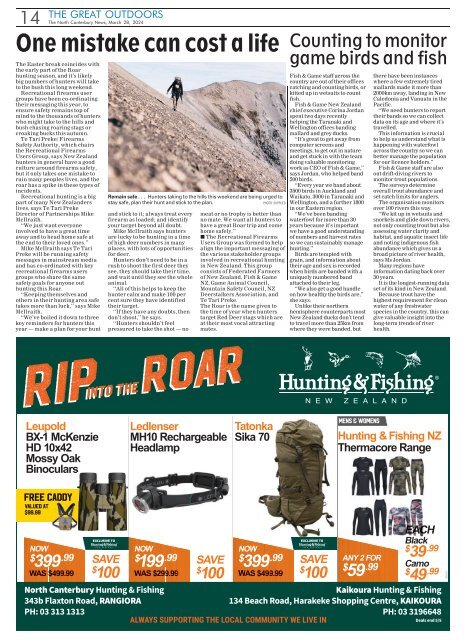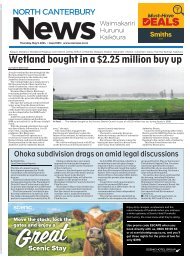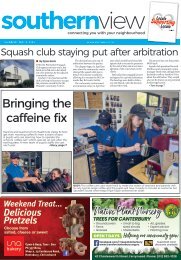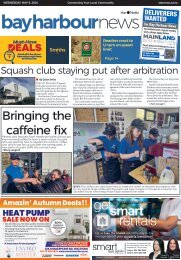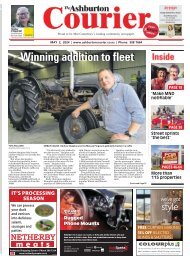North Canterbury News: March 28, 2024
You also want an ePaper? Increase the reach of your titles
YUMPU automatically turns print PDFs into web optimized ePapers that Google loves.
14 The<br />
THE GREAT OUTDOORS<br />
<strong>North</strong> <strong>Canterbury</strong> <strong>News</strong>, <strong>March</strong> <strong>28</strong>, <strong>2024</strong><br />
One mistake can cost alife<br />
The Easter break coincides with<br />
the early part of the Roar<br />
hunting season, and it’s likely<br />
big numbers of hunters will take<br />
to the bush this long weekend.<br />
Recreational firearms user<br />
groups have been coordinating<br />
their messaging this year, to<br />
ensure safety remains top of<br />
mind to the thousands of hunters<br />
who might take to the hills and<br />
bush chasingroaring stags or<br />
croaking bucks this autumn.<br />
Te Tari Preke/ Firearms<br />
Safety Authority, which chairs<br />
the Recreational Firearms<br />
Users Group, says New Zealand<br />
hunters in general have agood<br />
culturearound firearms safety,<br />
but it only takes one mistake to<br />
ruin many peoples lives,and the<br />
roar has aspike in these types of<br />
incidents.<br />
Recreational hunting is abig<br />
part of many New Zealanders<br />
lives, says Te Tari Preke<br />
DirectorofPartnerships Mike<br />
McIlraith.<br />
‘‘We just want everyone<br />
involved to have agreat time<br />
away and to head home safe at<br />
the end to their loved ones.’’<br />
Mike McIlraith says Te Tari<br />
Preke will be running safety<br />
messages in mainstream media<br />
and has coordinated with key<br />
recreational firearms users<br />
groups who share the same<br />
safety goals for anyone out<br />
hunting this Roar.<br />
‘‘Keeping themselves and<br />
others in their hunting area safe<br />
takes more than luck,’’ says Mike<br />
McIlraith.<br />
‘‘We’veboiled it down to three<br />
key reminders for hunters this<br />
year —make aplan for your hunt<br />
Remain safe ... Hunters taking to the hills this weekend are being urged to<br />
stay safe, plan their hunt and stick to the plan.<br />
PHOTO: SUPPLIED<br />
and stick to it; always treat every<br />
firearm as loaded; and identify<br />
your target beyond all doubt.<br />
Mike McIlraith says hunters<br />
are lucky to be hunting in atime<br />
of high deer numbersinmany<br />
places,with lots of opportunities<br />
for deer.<br />
Hunters don’t need to be in a<br />
rush to shoot the first deer they<br />
see, they should take their time,<br />
and wait until they see the whole<br />
animal.<br />
‘‘All of this helps to keep the<br />
hunter calm and make 100 per<br />
cent surethey have identified<br />
their target.<br />
‘‘If they have any doubts, then<br />
don’t shoot,’’ he says.<br />
‘‘Hunters shouldn’t feel<br />
pressured to take the shot — no<br />
meat or no trophy is better than<br />
no mate. We want all hunters to<br />
have agreat Roar trip and come<br />
home safely.’’<br />
The Recreational Firearms<br />
UsersGroupwas formed to help<br />
align the importantmessaging of<br />
the various stakeholder groups<br />
involved in recreational hunting<br />
in New Zealand. This group<br />
consists of Federated Farmers<br />
of New Zealand, Fish &Game<br />
NZ, Game Animal Council,<br />
Mountain Safety Council, NZ<br />
Deerstalkers Association,and<br />
Te Tari Preke.<br />
The Roar is the name given to<br />
the time of year when hunters<br />
target Red Deer stags which are<br />
at their most vocal attracting<br />
mates.<br />
Counting to monitor<br />
game birds and fish<br />
Fish &Game staff across the<br />
country are out of their offices<br />
catching and counting birds, or<br />
kittedupinwetsuits to count<br />
fish.<br />
Fish &Game New Zealand<br />
chief executive Corina Jordan<br />
spent two days recently<br />
helping the Taranaki and<br />
Wellington offices banding<br />
mallard and grey ducks.<br />
‘‘It’s great toget away from<br />
computer screens and<br />
meetings, toget out in nature<br />
and get stuck in with the team<br />
doing valuable monitoring<br />
work as CEO of Fish &Game,’’<br />
says Jordan, who helped band<br />
500 birds.<br />
‘‘Every year we band about<br />
3500 birds in Auckland and<br />
Waikato, 3000 in Taranaki and<br />
Wellington, and afurther 1800<br />
in our Eastern region.<br />
‘‘We’ve been banding<br />
waterfowl for more than 30<br />
years because it’s important<br />
we have agood understanding<br />
of numbers and harvest rates<br />
so we can sustainably manage<br />
hunting.’’<br />
Birds are tempted with<br />
grain, and information about<br />
their age and sex is recorded<br />
when birds are banded with a<br />
uniquely numbered band<br />
attached to their leg.<br />
‘‘We also get agood handle<br />
on how healthy the birds are,’’<br />
she says.<br />
Unlike their northern<br />
hemisphere counterparts most<br />
New Zealand ducks don’t tend<br />
to travel more than 25km from<br />
where they were banded, but<br />
there have been instances<br />
where afew extremely tired<br />
mallards made it more than<br />
2000km away, landing in New<br />
Caledonia and Vanuatuinthe<br />
Pacific.<br />
‘‘We need hunters to report<br />
their bands so we can collect<br />
data on its age and where it’s<br />
travelled.<br />
This information is crucial<br />
to help us understand what is<br />
happening with waterfowl<br />
across the country so we can<br />
better manage the population<br />
for our licence holders.’’<br />
Fish &Game staff are also<br />
out driftdiving rivers to<br />
monitor trout populations.<br />
The surveys determine<br />
overall trout abundance and<br />
set catch limitsfor anglers.<br />
The organisation monitors<br />
over 100 rivers this way.<br />
‘‘We kit up in wetsuits and<br />
snorkels and glide down rivers,<br />
not only counting trout but also<br />
assessing water clarity and<br />
habitat, and aquatic insect life<br />
and noting indigenous fish<br />
abundance which gives us a<br />
broad picture of river health,<br />
says Ms Jordan.<br />
Many regions have<br />
information dating back over<br />
30 years.<br />
It is the longestrunning data<br />
set of its kind in New Zealand.<br />
Because trout have the<br />
highest requirement for clean<br />
water of any freshwater<br />
species in the country, this can<br />
give valuable insight into the<br />
longterm trends of river<br />
health.<br />
2665242<br />
<strong>North</strong><strong>Canterbury</strong> Hunting&Fishing<br />
Kaikoura Hunting&Fishing<br />
343b FlaxtonRoad, RANGIORA<br />
134 BeachRoad, HarakekeShoppingCentre, KAIKOURA<br />
PH:03313 1313<br />
PH:033196648<br />
ALWAYSSUPPORTINGTHE LOCALCOMMUNITY WE LIVE IN<br />
Dealsend 5/5


